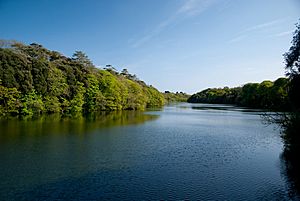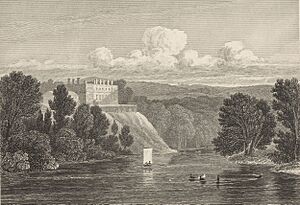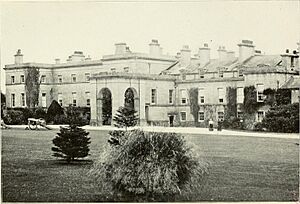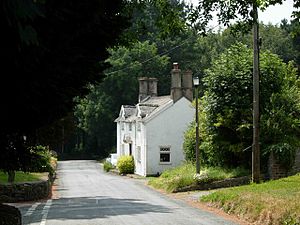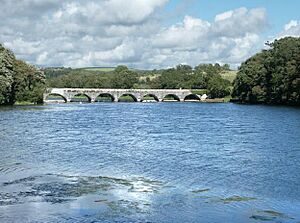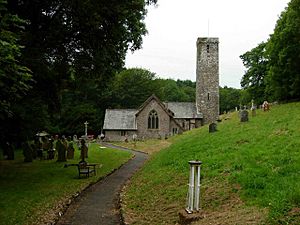Stackpole Estate facts for kids
Quick facts for kids Stackpole Estate |
|
|---|---|
|
Ystad Ystagbwll
|
|
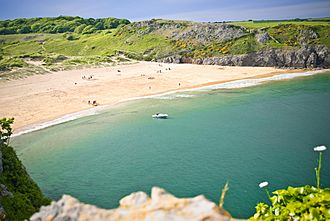
Barafundle Bay on the Stackpole Estate
|
|
| General information | |
| Location | Pembrokeshire, Wales |
| Address | 9th Bryn Hill |
| Country | United Kingdom |
| Coordinates | 51°37′30″N 4°54′09″W / 51.62510°N 4.90238°W |
The Stackpole Estate (which is Ystad Ystagbwll in Welsh) is a large area of land in Pembrokeshire, Wales. It sits between the villages of Stackpole and Bosherston. This beautiful estate is part of the Pembrokeshire Coast National Park.
The estate covers about 5 square miles (13 square kilometers). It includes farms, lakes, forests, beaches, and cliffs. Visitors can explore the estate at any time. The National Trust owns and takes care of this special place.
Contents
What's in a Name? The Meaning of Stackpole
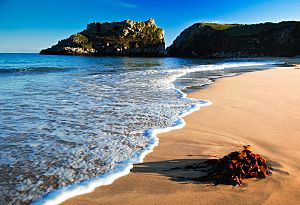
Before the 1600s, the name was written as Stacpole or Stakepole. The name comes from two Welsh words. 'Stac-' means an isolated, tall rock. '-pwll' means a pool.
People believe the "stac" in the name refers to Stack Rock. This rock is at the entrance to Broad Haven South. It might have marked the way into an old waterway that was used as a harbor.
Wildlife and Nature at Stackpole
The Stackpole Estate is home to two amazing beaches: Barafundle Bay and Broad Haven South. The estate also has 100 acres (0.4 square kilometers) of lakes. These lakes are known as the Lily Ponds.
Many animals live here, including Eurasian otters, goosanders, and kingfishers. From the cliffs and beaches, you might spot bottlenose dolphins and even basking sharks. Seabirds like kittiwakes and red-billed choughs also make their home here. Stackpole has one of the largest groups of greater horseshoe bats in Britain.
A Look Back in Time: Stackpole's History
Stackpole Court: A Grand House
Stackpole Court was a very large house built near Stackpole village. During the English Civil War in the 1600s, the Lort family owned the estate. They supported the King, and their house was attacked by the Parliamentarians. The Lorts eventually gave up.
Later, in 1698, the estate went to Elizabeth Lort. Her son, John Campbell, took over in 1714. A new, grand house made of limestone was built later. It had huge gardens and many plants.
At the start of World War II, much of the farmland was taken by the military. It became a training ground for British soldiers. The Castlemartin Training Area still uses this land today. Because of this, the estate became too expensive to keep. The Cawdor family, who owned it then, moved back to Scotland in the early 1940s.
The empty mansion was very costly to maintain. So, it was sadly taken down in 1963. Today, the National Trust looks after the estate's other buildings, parkland, and beaches. Everyone can enjoy them. The 100 acres of lakes, now called the Lily Ponds, were created by the Cawdor family in the 1700s and 1800s. They built dams across three narrow valleys.
Stackpole Village: A Changing Community
Stackpole village is about 4 miles (6.4 kilometers) south of Pembroke. Around 200 people live there. The village has its own primary school for children aged 4 to 11. The school was built in the late 1800s.
The village was actually moved from its original spot in 1735. This was done to make more space for the growing Stackpole Estate. Today, Stackpole is much bigger than it was back then. It has a pub called The Stackpole Inn, which used to be the village Post Office. The village is surrounded by woods and farmland.
In the 1950s and 1960s, more modern homes were built in the village. These were located near Deer Park and the school.
Just outside the village is the Stackpole Outdoor Learning Centre. This center is run by the National Trust. It has a theater, a bar, and rooms for meetings. It is right next to the Lily Ponds and the Eight-Arch Bridge. It's also less than a 1-mile (1.6-kilometer) walk from Broad Haven South beach.
Elidor Church: A Historic Place of Worship
St Elidyr's Church, Stackpole is dedicated to St. James and St Elidyr. It dates back to the 1200s. The church is in a quiet, wooded valley. Only a few small cottages and the rectory are nearby.
The church is shaped like a cross, with a main hall (nave) and a chancel at one end. The tall, thin tower is the oldest part, likely from the 1200s.
By 1851, the church needed a lot of repair, even though it had been looked after before. In 1807, church leaders said it was in good condition. But by 1848, they noted it was very damp and its windows didn't open.
In 1851, John Frederick Campbell hired Sir George Gilbert Scott, a famous church architect. He oversaw the restoration work, which cost a lot of money. The church today shows his careful work. It has a tall arch, colorful tiles on the floor, and beautiful window designs.
Images for kids
-
Barafundle Bay on the Stackpole Estate
-
As viewed from the sea, the rock formations at Broad Haven South may have given Stackpole its name
 | Shirley Ann Jackson |
 | Garett Morgan |
 | J. Ernest Wilkins Jr. |
 | Elijah McCoy |


